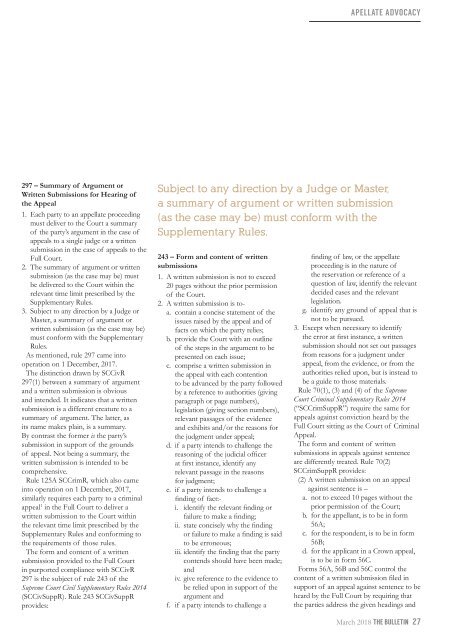LSB March 2018_Web
You also want an ePaper? Increase the reach of your titles
YUMPU automatically turns print PDFs into web optimized ePapers that Google loves.
APELLATE ADVOCACY<br />
297 – Summary of Argument or<br />
Written Submissions for Hearing of<br />
the Appeal<br />
1. Each party to an appellate proceeding<br />
must deliver to the Court a summary<br />
of the party’s argument in the case of<br />
appeals to a single judge or a written<br />
submission in the case of appeals to the<br />
Full Court.<br />
2. The summary of argument or written<br />
submission (as the case may be) must<br />
be delivered to the Court within the<br />
relevant time limit prescribed by the<br />
Supplementary Rules.<br />
3. Subject to any direction by a Judge or<br />
Master, a summary of argument or<br />
written submission (as the case may be)<br />
must conform with the Supplementary<br />
Rules.<br />
As mentioned, rule 297 came into<br />
operation on 1 December, 2017.<br />
The distinction drawn by SCCivR<br />
297(1) between a summary of argument<br />
and a written submission is obvious<br />
and intended. It indicates that a written<br />
submission is a different creature to a<br />
summary of argument. The latter, as<br />
its name makes plain, is a summary.<br />
By contrast the former is the party’s<br />
submission in support of the grounds<br />
of appeal. Not being a summary, the<br />
written submission is intended to be<br />
comprehensive.<br />
Rule 125A SCCrimR, which also came<br />
into operation on 1 December, 2017,<br />
similarly requires each party to a criminal<br />
appeal 1 in the Full Court to deliver a<br />
written submission to the Court within<br />
the relevant time limit prescribed by the<br />
Supplementary Rules and conforming to<br />
the requirements of those rules.<br />
The form and content of a written<br />
submission provided to the Full Court<br />
in purported compliance with SCCivR<br />
297 is the subject of rule 243 of the<br />
Supreme Court Civil Supplementary Rules 2014<br />
(SCCivSuppR). Rule 243 SCCivSuppR<br />
provides:<br />
Subject to any direction by a Judge or Master,<br />
a summary of argument or written submission<br />
(as the case may be) must conform with the<br />
Supplementary Rules.<br />
243 – Form and content of written<br />
submissions<br />
1. A written submission is not to exceed<br />
20 pages without the prior permission<br />
of the Court.<br />
2. A written submission is toa.<br />
contain a concise statement of the<br />
issues raised by the appeal and of<br />
facts on which the party relies;<br />
b. provide the Court with an outline<br />
of the steps in the argument to be<br />
presented on each issue;<br />
c. comprise a written submission in<br />
the appeal with each contention<br />
to be advanced by the party followed<br />
by a reference to authorities (giving<br />
paragraph or page numbers),<br />
legislation (giving section numbers),<br />
relevant passages of the evidence<br />
and exhibits and/or the reasons for<br />
the judgment under appeal;<br />
d. if a party intends to challenge the<br />
reasoning of the judicial officer<br />
at first instance, identify any<br />
relevant passage in the reasons<br />
for judgment;<br />
e. if a party intends to challenge a<br />
finding of fact:-<br />
i. identify the relevant finding or<br />
failure to make a finding;<br />
ii. state concisely why the finding<br />
or failure to make a finding is said<br />
to be erroneous;<br />
iii. identify the finding that the party<br />
contends should have been made;<br />
and<br />
iv. give reference to the evidence to<br />
be relied upon in support of the<br />
argument and<br />
f. if a party intends to challenge a<br />
finding of law, or the appellate<br />
proceeding is in the nature of<br />
the reservation or reference of a<br />
question of law, identify the relevant<br />
decided cases and the relevant<br />
legislation.<br />
g. identify any ground of appeal that is<br />
not to be pursued.<br />
3. Except when necessary to identify<br />
the error at first instance, a written<br />
submission should not set out passages<br />
from reasons for a judgment under<br />
appeal, from the evidence, or from the<br />
authorities relied upon, but is instead to<br />
be a guide to those materials.<br />
Rule 70(1), (3) and (4) of the Supreme<br />
Court Criminal Supplementary Rules 2014<br />
(“SCCrimSuppR”) require the same for<br />
appeals against conviction heard by the<br />
Full Court sitting as the Court of Criminal<br />
Appeal.<br />
The form and content of written<br />
submissions in appeals against sentence<br />
are differently treated. Rule 70(2)<br />
SCCrimSuppR provides:<br />
(2) A written submission on an appeal<br />
against sentence is –<br />
a. not to exceed 10 pages without the<br />
prior permission of the Court;<br />
b. for the appellant, is to be in form<br />
56A;<br />
c. for the respondent, is to be in form<br />
56B;<br />
d. for the applicant in a Crown appeal,<br />
is to be in form 56C.<br />
Forms 56A, 56B and 56C control the<br />
content of a written submission filed in<br />
support of an appeal against sentence to be<br />
heard by the Full Court by requiring that<br />
the parties address the given headings and<br />
<strong>March</strong> <strong>2018</strong> THE BULLETIN 27


















